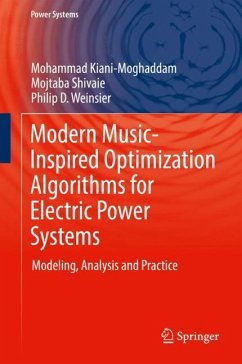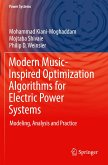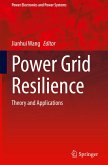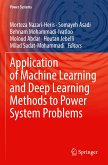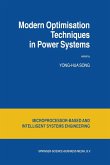In today's world, with an increase in the breadth and scope of real-world engineering optimization problems as well as with the advent of big data, improving the performance and efficiency of algorithms for solving such problems has become an indispensable need for specialists and researchers. In contrast to conventional books in the field that employ traditional single-stage computational, single-dimensional, and single-homogeneous optimization algorithms, this book addresses multiple newfound architectures for meta-heuristic music-inspired optimization algorithms. These proposed algorithms, with multi-stage computational, multi-dimensional, and multi-inhomogeneous structures, bring about a new direction in the architecture of meta-heuristic algorithms for solving complicated, real-world, large-scale, non-convex, non-smooth engineering optimization problems having a non-linear, mixed-integer nature with big data. The architectures of these new algorithms may also be appropriate for finding an optimal solution or a Pareto-optimal solution set with higher accuracy and speed in comparison to other optimization algorithms, when feasible regions of the solution space and/or dimensions of the optimization problem increase.
This book, unlike conventional books on power systems problems that only consider simple and impractical models, deals with complicated, techno-economic, real-world, large-scale models of power systems operation and planning. Innovative applicable ideas in these models make this book a precious resource for specialists and researchers with a background in power systems operation and planning.
Provides an understanding of the optimization problems and algorithms, particularly meta-heuristic optimization algorithms, found in fields such as engineering, economics, management, and operations research;
Enhances existing architectures and develops innovative architectures for meta-heuristic music-inspired optimization algorithms in order to deal with complicated, real-world, large-scale, non-convex, non-smooth engineering optimization problems having a non-linear, mixed-integer nature with big data;
Addresses innovative multi-level, techno-economic, real-world, large-scale, computational-logical frameworks for power systems operation and planning, and illustrates practical training on implementation of the frameworks using the meta-heuristic music-inspired optimization algorithms.
This book, unlike conventional books on power systems problems that only consider simple and impractical models, deals with complicated, techno-economic, real-world, large-scale models of power systems operation and planning. Innovative applicable ideas in these models make this book a precious resource for specialists and researchers with a background in power systems operation and planning.
Provides an understanding of the optimization problems and algorithms, particularly meta-heuristic optimization algorithms, found in fields such as engineering, economics, management, and operations research;
Enhances existing architectures and develops innovative architectures for meta-heuristic music-inspired optimization algorithms in order to deal with complicated, real-world, large-scale, non-convex, non-smooth engineering optimization problems having a non-linear, mixed-integer nature with big data;
Addresses innovative multi-level, techno-economic, real-world, large-scale, computational-logical frameworks for power systems operation and planning, and illustrates practical training on implementation of the frameworks using the meta-heuristic music-inspired optimization algorithms.

